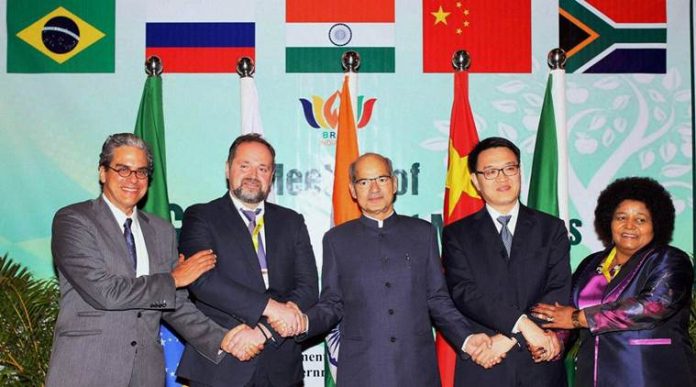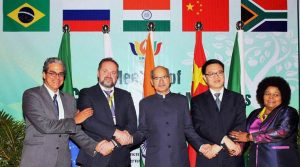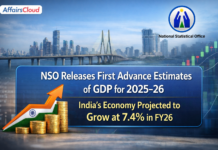The Environment Ministers of BRICS (Brazil, Russia, India, China and South Africa) countries meeting held on September 16, in Goa to strengthen mutual cooperation.
About BRICS :
BRICS is the acronym for an association of five major emerging national economies: Brazil, Russia, India, China and South Africa. Originally the first four were grouped as “BRIC” (or “the BRICs”), before the controversial addition of South Africa in 2010.
- The BRICS members are all leading developing or newly industrialized countries, but they are distinguished by their large, sometimes fast-growing economies and significant influence on regional affairs; all five are G-20 members.
- However, BRICS countries have significantly slowed down with South Africa only growing 1% in 2015 similar to the 1.6% a year from 1994 to 2009,Brazil in its worst recession since the 1930s by some measures, Russia in a recession as oil prices tailspin and sanctions weigh, and China’s slowdown is set to be a drag on global growth and is reported to be the slowest in the last 25 years.
- Russia hosted the group’s seventh summit in July 2015. India is going to host the BRICS conference in Goa in 2016. The term does not include countries such as South Korea, Mexico and Turkey for which other acronyms and group associations were later created.
- As of 2015, the five BRICS countries represent over 3 billion people, or 42% of the world population; all five members are in the top 25 of the world by population, and four are in the top 10.
- The five nations have a combined nominal GDP of US$16.039 trillion, equivalent to approximately 20% of the gross world product, and an estimated US$4 trillion in combined foreign reserves.
- The BRICS have received both praise and criticism from numerous commentators. Bilateral relations among BRICS nations have mainly been conducted on the basis of non-interference, equality, andmutual benefit.
Environmental Ministers Meet:
The meeting is expected to discuss Memorandum of Understanding and the Joint Working Group on environment.
- The BRICS Ministers are discussed thematic areas of mutual interest and priorities actions for cooperation in critical areas like air and water pollution, liquid and solid waste management, climate change and conservation of biodiversity.

- It is noted that there is a proposal from China that in April next year, technocrats and those who have specialised command on the subject will meet in Beijing.
- The ministers called upon the developed countries to honour their commitments related to means of implementation and facilitate its operationalisation with a clear road-map for the successful achievement of various global environmental agreements and sustainable development goals.
- As the Minister of the Host Nation, Minister of State (Independent Charge) of Environment, Forest and Climate Change, Shri Anil Madhav Dave inaugurated the meeting.
- The meeting of BRICS Environment Ministers is organized by the Ministry of Environment, Forest and Climate Change, Government of India.
BRICS Nations Join Hands to Save Environment :
The Environment Ministers of BRICS countries agreed on a Memorandum of Understanding and announced setting up of a Joint Working Group, institutionalizing their mutual cooperation on environment-related issues.
- The areas agreed for mutual cooperation are – abatement and control of air and water pollution, efficient management of liquid and solid waste, climate change and conservation of biodiversity.
- The BRICS countries resolved to set up a platform for innovations, knowledge sharing and capacity building including a common website, network of technical institutions and undertake joint projects in areas of mutual interest.
BRICS countries call for ‘zero waste’ approach in water and sanitation management
The three-day conference of BRICS on ‘Urban Transition’ ended in the port city here this evening with the member countries stressing on the need to ensure an “urban renaissance” to stimulate economic growth and enable decent living for all.
- It is noted that China has showcased the city of Shenzen where in only 6% of municipal solid waste is being dumped in the open.
- Experts have stressed the need to step up the capacities of cities to ensure such zero waste approach. Dr.B.Chandra Mohan, Revenue Secretary of Tamil Naidu said that Chennai is a leading example of resilience in water management being the first city in the country to set up a desalination plant enabling use of 200 million litres of sea water per day.
- During a discussion on ‘New Towns and Regional Planning’, the experts called for developing new urban habitations based on sound economic logic so that the inhabitants of such new locations are not pushed into ‘poverty traps’. This needs to be ensured through necessary linkages with other centres of production and consumption for employment generation on a sustainable basis.
- Experts from Brazil, China, India and South Africa voiced concern over unplanned and unanticipated urban expansion resulting in social and economic inequalities. Some of the experts called for ‘extended urbanism’ based on the principle of effective regional planning.






